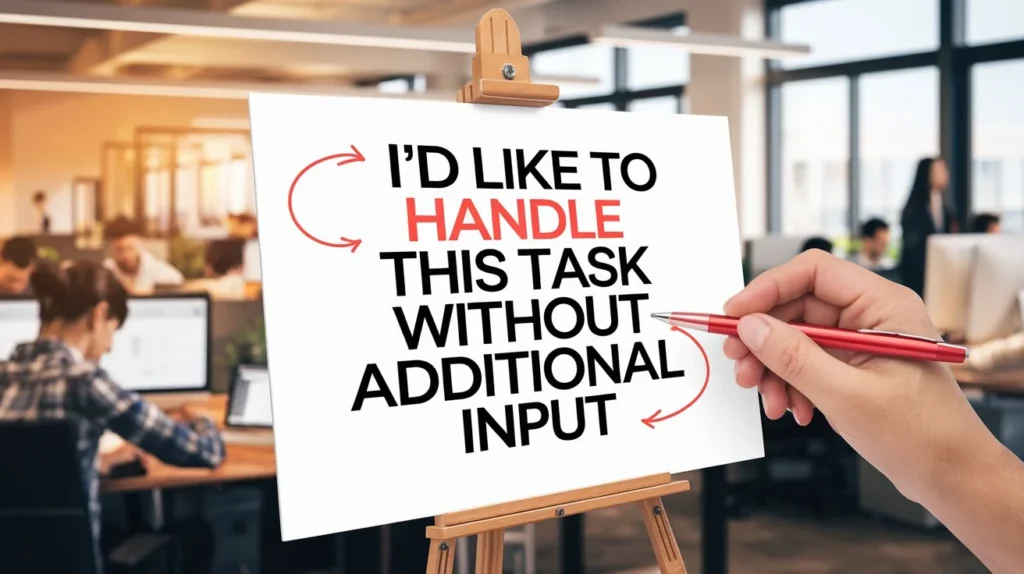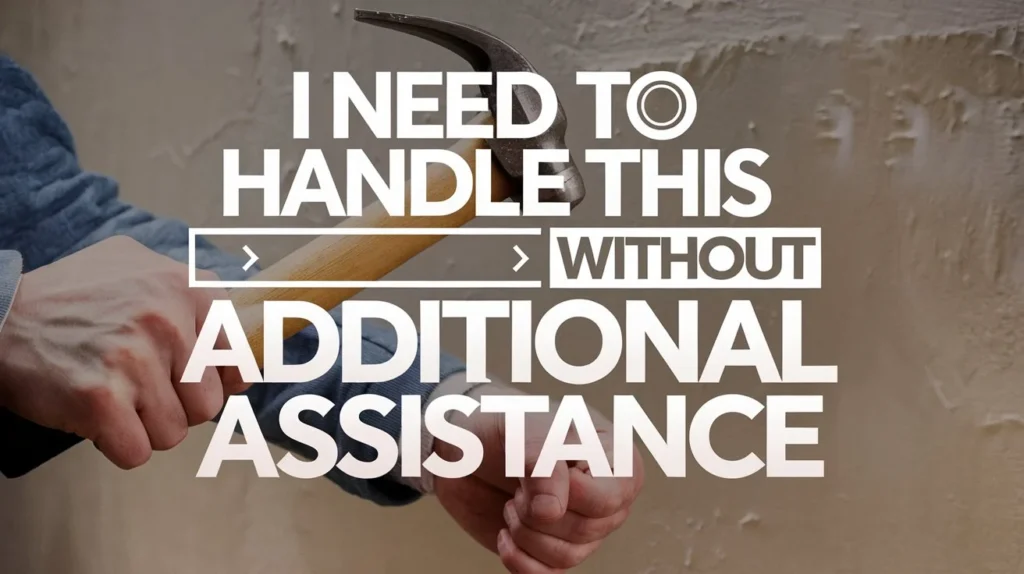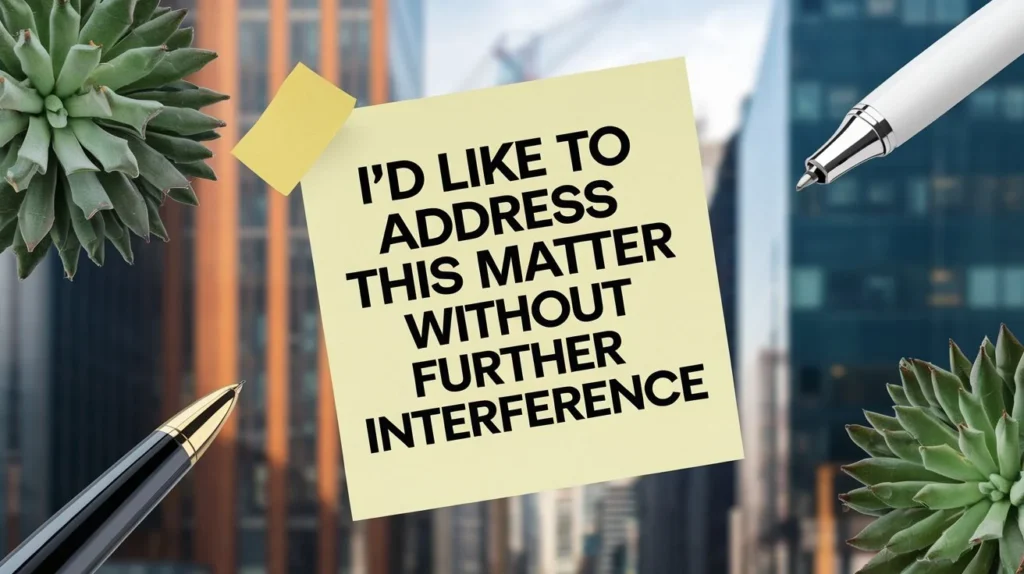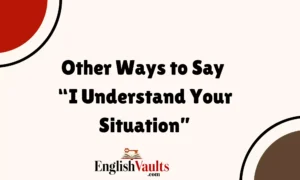Navigating workplace dynamics can be challenging, especially when it comes to addressing issues of boundary and space. It’s crucial to communicate your need for personal space or a reduction in involvement tactfully and professionally. Below are 25 professional ways to tell someone to back off at work, each with a practical scenario to illustrate its use. These phrases and scenarios will help you maintain professionalism while addressing your needs.
List of 25 Professional Ways to Tell Someone to Back Off at Work
- 1. I Appreciate Your Enthusiasm, But I Need Some Space
- 2. I’d Like to Handle This Task Without Additional Input
- 3. For This Project, I’ll Be Working Solo
- 4. I Would Prefer to Take the Lead on This
- 5. I Need to Focus on This Area Alone
- 6. I’m Currently Handling This Task on My Own
- 7. I Prefer to Manage This Independently
- 8. I Need Some Time to Work on This Without Distractions
- 9. I’d Appreciate It If We Could Limit Input on This
- 10. I’m Taking Full Responsibility for This Task
- 11. I’d Like to Address This Issue on My Own
- 12. I Need to Handle This Without Additional Assistance
- 13. I’m Managing This Project on My Own
- 14. I Need to Focus on This Without External Input
- 15. I Would Prefer If We Could Keep This Separate
- 16. I’m Handling This Aspect by Myself
- 17. I Prefer to Work on This Without Interference
- 18. I’d Like to Keep This Task Exclusively to Myself
- 19. I Need to Manage This Aspect Independently
- 20. I Would Prefer Not to Receive Further Input
- 21. I Need to Work on This Without Additional Distractions
- 22. I’m Handling This Project Solo
- 23. I Prefer to Work on This Issue Alone
- 24. I’d Like to Address This Matter Without Further Interference
- 25. I’m Taking Full Charge of This Task
1. I Appreciate Your Enthusiasm, But I Need Some Space
Scenario:
Subject: Project Scope Clarification
Email:
Hi Leo,
I hope you’re doing well.
I appreciate your enthusiasm, but I need some space to focus on the project scope independently. I believe I can tackle the upcoming tasks more effectively if I handle them on my own.
Please feel free to share any critical updates, but I would prefer to manage the details for now.
Thank you for understanding.
Best regards, Henry
Addition: This phrase acknowledges the recipient’s eagerness while clearly requesting space, maintaining a positive tone.
2. I’d Like to Handle This Task Without Additional Input

Scenario:
Subject: Marketing Strategy Development
Email:
Dear Leo,
I hope this message finds you well.
I’d like to handle this task without additional input at this stage. I have a specific plan in mind for the marketing strategy and would appreciate the opportunity to develop it further on my own.
Thank you for your cooperation.
Best regards, Henry
Addition: This phrasing is useful when you prefer to work on a project independently without further contributions at a particular time.
3. For This Project, I’ll Be Working Solo
Scenario:
Subject: Upcoming Presentation
Email:
Hi Leo,
I hope you’re having a good day.
For this project, I’ll be working solo. I have a clear approach and timeline for the presentation, and I believe it’s best if I manage it independently.
I’ll update you on the progress as needed.
Best regards, Henry
Addition: This phrase sets clear boundaries regarding the scope of your solo work, while indicating that updates will be provided.
4. I Would Prefer to Take the Lead on This
Scenario:
Subject: Team Assignment Roles
Email:
Dear Leo,
I hope you’re well.
I would prefer to take the lead on this aspect of the team assignment. It’s essential for me to drive this part of the project to ensure alignment with my vision.
Thank you for your understanding.
Best regards, Henry
Addition: Use this phrase to assert your role in leading a specific task or project while maintaining a collaborative spirit.
5. I Need to Focus on This Area Alone
Scenario:
Subject: Internal Process Improvement
Email:
Hi Leo,
I hope you’re doing well.
I need to focus on this area alone for the time being. I believe that managing this aspect of the internal process improvement independently will lead to the best results.
Please let me know if you have any essential insights or updates.
Best regards, Henry
Addition: This phrase communicates your intention to work independently, while remaining open to crucial feedback.
6. I’m Currently Handling This Task on My Own
Scenario:
Subject: Data Analysis Report
Email:
Dear Leo,
I hope this email finds you in good spirits.
I’m currently handling this task on my own to ensure consistency in the data analysis report. I have a specific method in mind and would like to see it through without additional contributions at this stage.
Thank you for your patience.
Best regards, Henry
Addition: This phrasing clearly communicates that you’re working independently, emphasizing the importance of consistency.
7. I Prefer to Manage This Independently
Scenario:
Subject: Budget Review
Email:
Hi Leo,
I hope you’re having a productive week.
I prefer to manage this independently for the budget review. I have a detailed approach that I would like to follow without external input at this moment.
I’ll keep you informed of any significant developments.
Best regards, Henry
Addition: This phrase shows a preference for independent management while promising to keep the recipient updated on major changes.
8. I Need Some Time to Work on This Without Distractions
Scenario:
Subject: Strategic Plan Development
Email:
Dear Leo,
I hope you’re well.
I need some time to work on this without distractions for the strategic plan development. To achieve the best results, I require focused time to address this area thoroughly.
Please reach out if you have any urgent concerns.
Best regards, Henry
Addition: This phrasing emphasizes the need for uninterrupted work time while acknowledging that you are open to urgent concerns.
9. I’d Appreciate It If We Could Limit Input on This
Scenario:
Subject: Software Implementation Plan
Email:
Hi Leo,
I hope you’re doing well.
I’d appreciate it if we could limit input on this software implementation plan for now. I have a clear direction and would like to proceed with minimal interruptions.
Thank you for your understanding.
Best regards, Henry
Addition: This expression requests to limit input while showing appreciation for the recipient’s understanding and cooperation.
10. I’m Taking Full Responsibility for This Task
Scenario:
Subject: Client Proposal
Email:
Dear Leo,
I hope this email finds you well.
I’m taking full responsibility for this task related to the client proposal. It’s crucial for me to handle this independently to ensure it meets our standards.
I’ll update you once the proposal is finalized.
Best regards, Henry
Addition: This phrase clarifies that you are assuming complete responsibility, reinforcing your need to work independently.
11. I’d Like to Address This Issue on My Own
Scenario:
Subject: Team Dynamics Concern
Email:
Hi Leo,
I hope you’re having a good day.
I’d like to address this issue on my own regarding team dynamics. I believe handling this independently will allow me to approach the situation more effectively.
I’ll let you know if I need further assistance.
Best regards, Henry
Addition: This phrasing indicates a desire to address a sensitive issue independently, while leaving room for future assistance if needed.
12. I Need to Handle This Without Additional Assistance

Scenario:
Subject: Contract Negotiations
Email:
Dear Leo,
I hope you’re doing well.
I need to handle this without additional assistance for the contract negotiations. I have a strategy in mind and would like to manage the process on my own.
Please reach out if there are critical updates.
Best regards, Henry
Addition: This phrase specifies the need for independent handling of a task while being open to receiving important updates.
13. I’m Managing This Project on My Own
Scenario:
Subject: Market Research
Email:
Hi Leo,
I hope you’re well.
I’m managing this project on my own for the market research. I have a specific approach that I believe will be most effective if I handle it independently.
Thank you for your understanding.
Best regards, Henry
Addition: This phrasing confirms your intention to manage a project independently while expressing gratitude for the recipient’s understanding.
14. I Need to Focus on This Without External Input
Scenario:
Subject: Process Improvement Initiative
Email:
Dear Leo,
I hope you’re having a productive day.
I need to focus on this without external input for the process improvement initiative. I’m aiming for a streamlined approach and would prefer to handle it on my own for now.
Feel free to contact me if there are urgent matters.
Best regards, Henry
Addition: This phrase communicates your need for focus while allowing for communication about urgent matters.
15. I Would Prefer If We Could Keep This Separate
Scenario:
Subject: Employee Performance Review
Email:
Hi Leo,
I hope this message finds you well.
I would prefer if we could keep this separate from other ongoing discussions. I need to address the employee performance review independently to ensure a clear and unbiased assessment.
Thank you for your cooperation.
Best regards, Henry
Addition: Use this phrase to request separation of tasks or discussions to maintain clarity and focus.
16. I’m Handling This Aspect by Myself
Scenario:
Subject: Product Launch
Email:
Dear Leo,
I hope you’re doing well.
I’m handling this aspect by myself for the product launch. I have specific plans and timelines that I need to adhere to, and it’s essential that I work on this independently.
I’ll update you with any significant developments.
Best regards, Henry
Addition: This phrase reinforces your need to work independently on a project aspect while promising updates on progress.
17. I Prefer to Work on This Without Interference
Scenario:
Subject: Sales Report Analysis
Email:
Hi Leo,
I hope you’re having a great day.
I prefer to work on this without interference while analyzing the sales report. It’s important for me to have uninterrupted time to ensure thorough and accurate analysis.
Thank you for your understanding.
Best regards, Henry
Addition: This expression emphasizes the need for uninterrupted work time, maintaining professionalism and courtesy.
18. I’d Like to Keep This Task Exclusively to Myself

Scenario:
Subject: Annual Budget Preparation
Email:
Dear Leo,
I hope this email finds you well.
I’d like to keep this task exclusively to myself for the annual budget preparation. I have a specific approach in mind that I believe will be most effective if I handle it alone.
Please let me know if there are any critical updates or changes.
Best regards, Henry
Addition: This phrase requests exclusive management of a task, while remaining open to critical updates.
19. I Need to Manage This Aspect Independently
Scenario:
Subject: Training Program Development
Email:
Hi Leo,
I hope you’re well.
I need to manage this aspect independently of the training program development. I believe working on this alone will allow me to ensure it aligns perfectly with our objectives.
Thank you for your cooperation.
Best regards, Henry
Addition: This phrasing highlights the need for independent management of a project component, while expressing appreciation for cooperation.
20. I Would Prefer Not to Receive Further Input
Scenario:
Subject: Client Engagement Strategy
Email:
Dear Leo,
I hope you’re doing well.
I would prefer not to receive further input on the client engagement strategy at this time. I have a clear vision and plan that I need to follow without additional suggestions.
I’ll keep you informed of progress as necessary.
Best regards, Henry
Addition: This phrase politely requests no further input while indicating that progress updates will be provided.
21. I Need to Work on This Without Additional Distractions
Scenario:
Subject: Project Milestones
Email:
Hi Leo,
I hope you’re having a productive week.
I need to work on this without additional distractions related to the project milestones. It’s crucial for me to focus solely on this aspect to ensure timely and accurate delivery.
Please reach out if anything urgent arises.
Best regards, Henry
Addition: This phrase underscores the need for focus while being open to addressing urgent issues if they arise.
22. I’m Handling This Project Solo
Scenario:
Subject: Event Planning
Email:
Dear Leo,
I hope you’re well.
I’m handling this project solo for the upcoming event planning. I have a detailed plan in place and would prefer to execute it independently to ensure all aspects are managed effectively.
Thank you for your support.
Best regards, Henry
Addition: This expression communicates your intention to manage a project alone, highlighting your detailed planning and execution strategy.
23. I Prefer to Work on This Issue Alone
Scenario:
Subject: Vendor Negotiations
Email:
Hi Leo,
I hope you’re doing well.
I prefer to work on this issue alone concerning vendor negotiations. I have specific strategies in mind that I’d like to implement without additional input at this moment.
I’ll update you with any major developments.
Best regards, Henry
Addition: Use this phrase to indicate a preference for independent work on a specific issue while committing to provide updates.
24. I’d Like to Address This Matter Without Further Interference

Scenario:
Subject: Team Project Coordination
Email:
Dear Leo,
I hope this message finds you well.
I’d like to address this matter without further interference related to the team project coordination. I believe managing this independently will help streamline the process and achieve better results.
Thank you for understanding.
Best regards, Henry
Addition: This phrase requests minimal interference while explaining that independent management will enhance the process.
25. I’m Taking Full Charge of This Task
Scenario:
Subject: Product Development
Email:
Hi Leo,
I hope you’re having a great day.
I’m taking full charge of this task for product development. I have a comprehensive plan and prefer to handle this independently to ensure it aligns with our goals.
Thank you for your cooperation.
Best regards, Henry
Addition: This expression asserts your role in leading a task, emphasizing your comprehensive approach and requesting cooperation.
These phrases provide a range of professional ways to communicate your need for personal space or reduced involvement in various work scenarios. Tailoring these expressions to fit specific situations helps maintain a respectful and constructive workplace environment.










